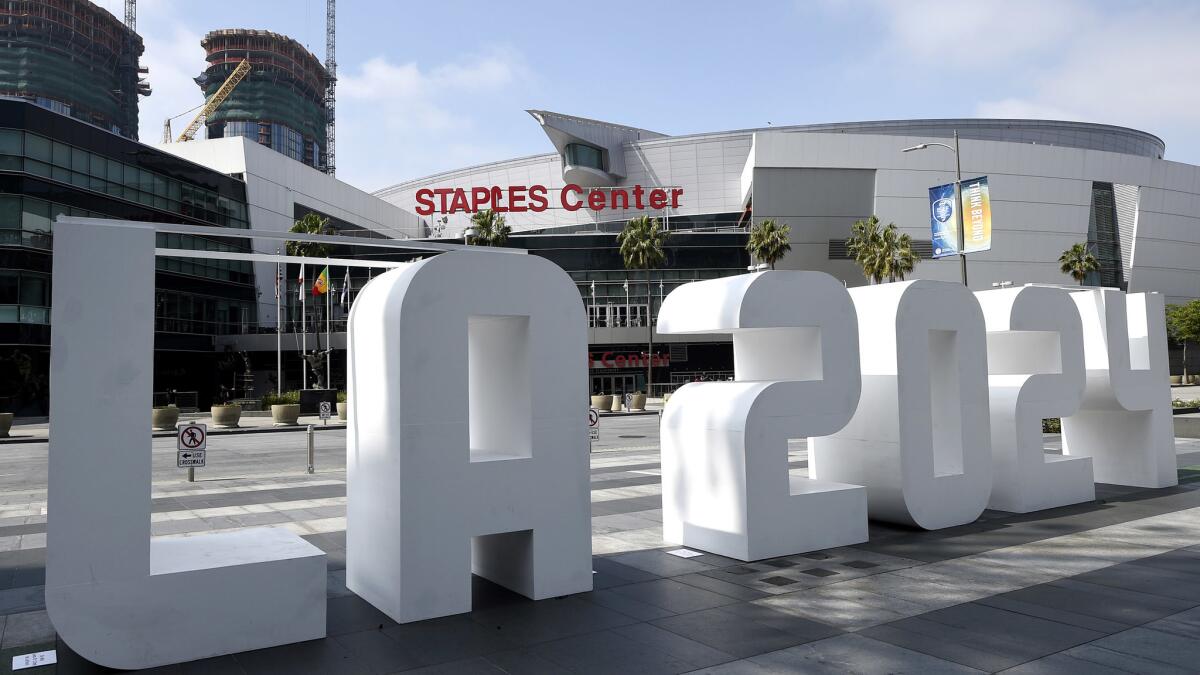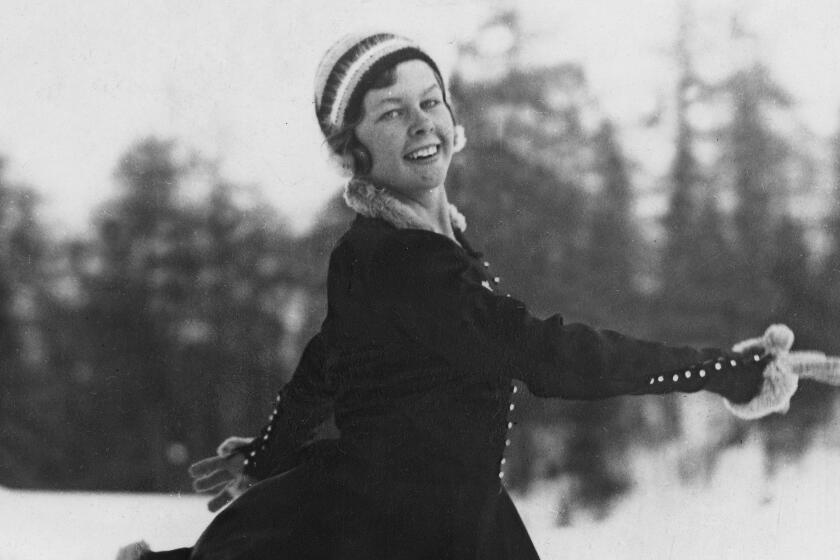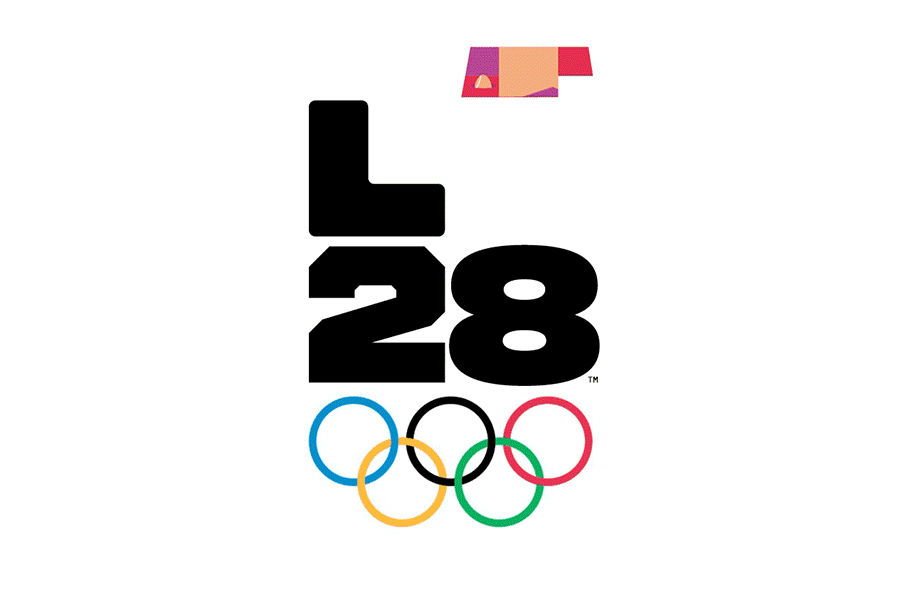L.A.’s game plan for 2024 Olympics wins praise from foreign media

Now the French get their turn.
Bid leaders seeking to win the 2024 Summer Games for Paris will spend Tuesday guiding Olympic officials on a tour of their city, stopping by the Eiffel Tower and the Palace of Versailles.
Los Angeles had the same opportunity last week, showing the evaluation commission from the International Olympic Committee a series of proposed venues ranging from the Coliseum to Santa Monica beach.
The assessment phase of the 2024 competition isn’t just about courting the IOC. The rival bid committees also hope to impress international media who can spread the word to distant countries where IOC voters live.
During L.A.’s session, reporters watched the Dodgers from a luxury suite, nibbled on dry-aged beef tartare at Otium restaurant and shook hands with Jimmy Kimmel after his show.
The verdict on Paris will have to wait until its evaluation concludes on Wednesday. But, before foreign journalists left Southern California, they shared first impressions — good and bad — of LA 2024 and the bid race.
Stadiums and arenas
Host city proposals often involve extensive construction with candidates promising to build shiny new venues. LA 2024 leaders have instead based their plan on existing facilities.
Duncan Mackay, insidethegames.biz, England: “It’s quite refreshing to come to a bid where you’re told all these things exist and they’re actually here. We can’t help but be impressed.”
Yuki Ohba, NHK public broadcasting, Japan: “You’ve actually been using these stadiums — it’s not like they are just left over from 1984.”
Thierry Vildary, France Televisions public broadcasting, France: “These are venues I saw on TV since I was young. Like the Rose Bowl, the Coliseum. After a week, I say the competition is like a tank against a Renault. L.A. is too huge, too impressive.”
Budget
LA 2024 has proposed spending $5.3 billion, a relatively modest amount by modern Olympic standards. Athletes would be housed at UCLA, saving $1 billion or more on a new village. France has also presented a trim budget but would receive government funding and would have to build an athletes village at Saint Denis.
Alexei Tolkachev, Sovetski Sport, Russia: “[LA 2024 leaders] made sure to emphasize that their bid makes sense right now. It’s the practical choice.”
Ohba: “They say you’re not going to have any public investment — that sounds really good to us, especially coming from Japan where we have seen the rise in the [2020 Tokyo Olympics] budget. It’s a very big message to the IOC, I suppose.”
Mackay: “The village is a major infrastructure project for Paris that will probably run over budget because these things always do.”
Politics
Paris dodged a bullet when centrist Emmanuel Macron defeated Marine Le Pen of the far right in a recent presidential election. No such luck for the U.S., not with President Trump’s stances on immigration and foreign trade irritating some IOC members.
Aliou Goloko, allAfrica.com, Senegal: “Africans always face problems with visas. That includes athletes. In the U.S. there are some new rules for immigration under Donald Trump and of the seven countries that have restrictions, there are three African countries. It’s a great concern for us.”
Vildary: “Trump is a problem. We don’t know what can happen in the next day, the next hour.”
France still faces uncertainty with critical legislative elections next month and a potential rivalry between the new president and Paris Mayor Anne Hidalgo.
Vildary: “We don’t know if Macron will have a majority and we don’t know how it can work between him and Hidalgo.”
Sentiment
It’s no surprise that Paris 2024 is emphasizing Versailles and other landmarks. By most accounts, the City of Light holds a big edge in passion and sentiment.
Ohba: “The Eiffel Tower and those kinds of visual elements are very powerful.”
Tolkachev: “Maybe Paris is the more emotional choice for people. I think everybody wants to visit Paris. How can you drum up that emotional appeal for L.A.?”
Another factor: Paris has fallen short in previous bids and IOC voters tend to reward cities that keep trying.
Tolkachev: “I think people would feel almost guilty not voting for Paris. That’s what is so intriguing … we don’t know how people will vote. I wish to be in their minds but we’re not.”
Security
Terrorism was not a big issue during the L.A. evaluation. Bid leaders spoke briefly about placing its venues in clusters, grouping them inside secure perimeters.
Paris 2024 reportedly addressed the issue at a news conference on Sunday, insisting that rising tourism proves their city is safe. But the French capital has endured a series of attacks.
Mackay: “I mean, I’ve been to Paris quite a lot over the last few years and there’s a sense that something could happen at any time. That’s not as apparent [in L.A.].”
2028
With the candidates running neck and neck, the IOC has indicated it might award two Games, giving 2024 to one and 2028 to the other.
If a city agrees to wait four additional years, it could be in position to demand a bigger slice of Olympic revenues. The question is, would either side acquiesce? Who might blink first?
Vildary: “After the Paris visit, the negotiation for ’24 and ’28 begins. All the decisions will be taken there, I think.”
In the meantime, French bid leaders are trying to be persuasive, vowing that a Paris Olympics would include high-quality food and free WiFi for reporters.
Also, they located the press room for this week’s evaluation at the foot of the Eiffel Tower.
As Mackay explained in an email: “The setup for the media here in Paris is spectacular.”
Follow @LAtimesWharton on Twitter
More to Read
Go beyond the scoreboard
Get the latest on L.A.'s teams in the daily Sports Report newsletter.
You may occasionally receive promotional content from the Los Angeles Times.








